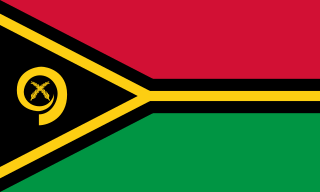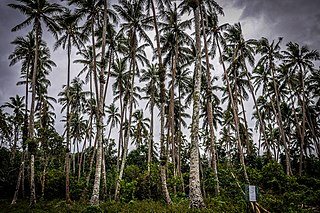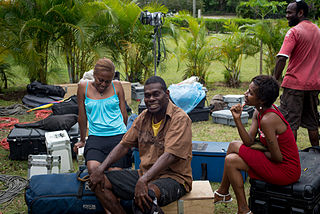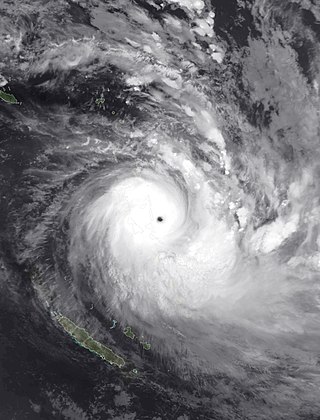Related Research Articles

Vanuatu, officially the Republic of Vanuatu, is an island country in Melanesia, located in the South Pacific Ocean. The archipelago, which is of volcanic origin, is 1,750 km (1,090 mi) east of northern Australia, 540 km (340 mi) northeast of New Caledonia, east of New Guinea, southeast of Solomon Islands, and west of Fiji.

Port Vila, or simply Vila, is the capital and largest city of Vanuatu. It is located on the island of Efate.

Espiritu Santo is the largest island in the nation of Vanuatu, with an area of 3,955.5 km2 (1,527.2 sq mi) and a population of around 40,000 according to the 2009 census.

Luganville is the second largest city in Vanuatu after the capital Port Vila; it is located on the island of Espiritu Santo and has a population of 18,062 as of the 2020 census. Those on Vanuatu's northern islands who regard Luganville as their big city, particularly indigenous populations, call it Santo; rural residents of Espiritu Santo call it Kanal. Luganville served as a major base of operations for American troops during World War II.

Pentecost Island is one of the 83 islands that make up the South Pacific nation of Vanuatu.
Port Olry is a small Francophone village on the island of Espiritu Santo in the Sanma Province of Vanuatu, with a population of 1,300, as estimated in 2009.

Paama is a small island in Malampa Province, Vanuatu.
Mwotlap is an Oceanic language spoken by about 2,100 people in Vanuatu. The majority of speakers are found on the island of Motalava in the Banks Islands, with smaller communities in the islands of Ra and Vanua Lava, as well as migrant groups in the two main cities of the country, Santo and Port Vila.
Moso Island is an island off the northwest coast of Efate in Vanuatu, in Shefa Province. It is separated from Efate by Namoso Passage, which is 200 metres (660 ft) wide at its narrowest point.

The Catholic Church in Vanuatu is part of the worldwide Catholic Church, under the spiritual leadership of the Pope in Rome. Catholics constitute 13% of the population of Vanuatu in 2022. The church is organized into one diocese based in the capital of Port Vila.
The literature of Vanuatu, understood in the strict sense of written literature, began in the 1960s.

Love Patrol is a ni-Vanuatu television series. It is the first ever locally produced television series in Vanuatu. Produced by Wan Smolbag Theatre with financial assistance from AusAID, NZAID and the Asian Development Bank, it is a soap opera with a serious message, intended primarily to educate viewers on the topic of AIDS. It also tackles "youth unemployment, police brutality and the hypocrisy of keeping youth uninformed about sex". UNAIDS reported that it explores "the growing issues of high rates of STIs among young people, high teenage pregnancy, lack of discourse on sex and risk taking behaviours in [...] Pacific communities". It has been described as an "edutainment" series.
The Pentecost Star is a ni-Vanuatu weekly newspaper, issued on Pentecost Island. It was founded in August 2007 by Keithly Hango.
Raga is the language of northern Pentecost Island in Vanuatu. Like all Vanuatu languages, Raga belongs to the Oceanic subgroup of the Austronesian languages family. In old sources the language is sometimes referred to by the names of villages in which it is spoken, such as Bwatvenua (Qatvenua), Lamalanga, Vunmarama and Loltong.
Life expectancy in Vanuatu is 67 years for men, and 70 years for women.

Fishing is important to the national economy of Vanuatu. It is the main source of income for many in the islands and Vanuatu's biggest export. According to 2009 figures, approximately 77% of households in Vanuatu are involved in fishing activity. According to 2005 figures, Vanuatu caught 151,080 fish in that year, with frozen fish accounted for half of Vanuatu's commodity exports.
The 2016 OFC U-20 Championship was the 21st edition of the OFC U-20 Championship, the biennial international youth football tournament organized by the Oceania Football Confederation (OFC) for players aged 19 and below. This year, the tournament was held in Vanuatu for the first time by itself.

Severe Tropical Cyclone Harold was a very powerful tropical cyclone which caused widespread destruction in the Solomon Islands, Vanuatu, Fiji, and Tonga during April 2020. It was the first Category 5 tropical cyclone in 2020. The seventh named storm of the 2019–20 Australian region cyclone season, eighth named storm, and fourth severe tropical cyclone of the 2019–20 South Pacific cyclone season, Harold was first noted as a developing tropical low within a trough of low pressure during April 1, while it was located to the east of Papua New Guinea. Over the next day, the system moved south-eastwards over the Solomon Sea, before it was classified as a tropical cyclone and named Harold by the Australian Bureau of Meteorology. The system moved into the Fiji Meteorological Service's area of responsibility on April 2 and began to explosively intensify by April 3, reaching Category 4 status by April 4 on both scales. The next day, it further strengthened into a Category 5 severe tropical cyclone, the highest rating on the Australian scale. It made landfall on Espiritu Santo on April 6 and the next day, strengthening to its peak intensity, attaining Category 5-equivalent intensity on the Saffir–Simpson scale before making landfall on Pentecost Island. Moving east, it weakened below Category 5 intensity on both scales over subsequent days. It regained Category 5 severe tropical cyclone status while passing south of Fiji, before weakening and becoming extratropical on April 9.

Squatting in the Republic of Vanuatu is the occupation of unused land or derelict buildings without the permission of the owner. After independence in 1980, informal settlements developed in cities such as Luganville and the capital Port Vila. Land in Vanuatu is either custom land owned by indigenous peoples or public land owned by the republic.
The 2022 MSG Prime Minister's Cup was held from 17–30 September 2022. Vanuatu hosted the competition with all matches being played at the Korman Stadium in Port Vila. The tournament was a resurrection of the Melanesia Cup which has not been held since the year 2000. It was a FIFA Tier-1 tournament.
References
- 1 2 "Sexual and reproductive health". Oxfam. 8 August 2011.
- ↑ "Oxfam New Zealand in the Pacific: Outline of Programmes and Plans".
- ↑ "Television can be good for your health". Oxfam. 28 February 2014.
- 1 2 "Love Patrol breaks down barriers in the Pacific". ABC News. ABC. 24 July 2014.
- ↑ "Improving community safety and resilience in Vanuatu". DFAT.
- ↑ "Wan Smolbag Theatre". Archived from the original on September 15, 2014. Retrieved November 19, 2013.
- ↑ Mawdsley. Engaging with Human Rights through Theater: A Case Study of the Vanuatu Rainbow Disability Theatre Group (PDF). Asia-Pacific Human Rights Information Center.
- ↑ Passingham (2002). Education and Sustainability: Responding to the Global Challenge. IUCN. p. 29. ISBN 9782831706238.
- ↑ "Year of the garden as ni-Vanuatu urged to grow their own". Secretariat of the Pacific Regional Environmental Programme.
- ↑ "Pacific Islander wins International Award for Turtle Conservation". ABC.